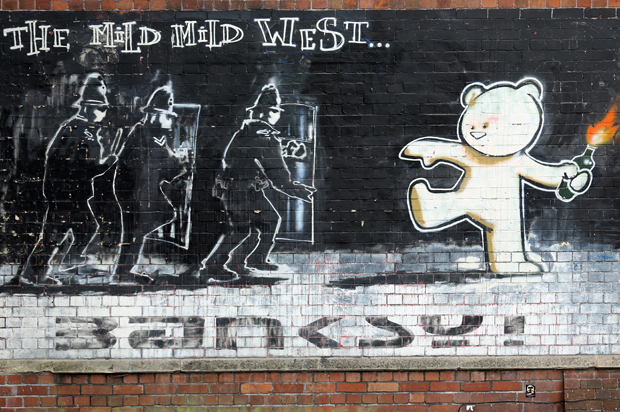When a man is tired of London, he just needs to relocate to Bristol — or so the stream of westbound émigrés would suggest. Each year, hundreds up sticks and flee the capital in search of its laid-back lifestyle.
Bristol prides itself on being the chilled-out alternative to the big smoke — a bit like Brighton, but further west and therefore cooler. Here they swap the ruthless capitalism of their blowhard cousins in London for giant water slides, balloon festivals and radical street art. But the city is still chippy about London’s cultural dominance.
I grew up in south Bristol, and went to the same school as its most famous export, the graffiti artist Banksy. Banksy’s caustic barbs — against politicians, priests and bankers — are a miniature snow globe of Bristolian attitudes. Ours is a radical city, the narrative goes, a repudiation of the square bureaucrats and businessmen in London. You guys can slog away on the capitalist treadmill all you like: we’re too easy-going for that.
A lot of my parents’ generation were exiles from London — many had been priced out of the capital and subsequently convinced themselves they’d never liked it there anyway. London was, as one friend’s dad told me, just ‘seven million people screaming me, me, me’.
Yet Bristol’s determination to define itself in opposition to the capital smothers the city’s vast potential. It is, after all, a genuinely beautiful place, with stunning Georgian terraces and easy access to countryside. But the culture is stifling — success, drive and ambition are treated not as virtues but as cause for shame. The city has, for many years, been nicknamed ‘the graveyard of ambition’: a label adopted with woolly-headed pride by the locals. It’s the inverted rhetoric of Bristolian exceptionalism — we’re the best city on earth precisely because we don’t try. As our chosen spokesman, Banksy, puts it: ‘People who get up early in the morning cause war, death and famine.’
How did this asinine anti-authoritarianism become the default position in Bristol? It seems to have arisen, in part, from the city’s uncomfortable relationship with its past. Bristol was the country’s leading slave port in the early 18th century, and the ‘Atlantic Trade’ generated much of its wealth and shaped its streets. The city has never properly confronted this difficult inheritance, finding it easier to sever ties with the past and generate a new myth: protest, counter-culture and environmentalism. But there’s something unsettling about pretending to live in an anarchist utopia, free of human conflict, in a place with such an ugly history.
Radicalism — or at least the forced mimicry of it — pervades all public life in Bristol. The city’s mayor, George Ferguson, describes himself as an ‘establishment rebel’. When a few years ago I worked at a community arts centre in the city, my colleagues celebrated the news of a nearby police station being trashed — ‘the effing pigs deserved it’, one told me. The following year a Tesco was stormed by rioters in Stokes Croft, a trendy area near the city centre. Their behaviour was met with a surprising level of approval, and commemorated by Banksy himself with his ‘Tesco Value petrol bomb’ poster. The Labour MP Kerry McCarthy, while denouncing the rioters’ actions, waxed about what she called the ‘People’s Republic of Stokes Croft’, with its ‘counter-culture: arty spaces, small venues, vegan cafés, graffiti-covered buildings’: the locals were ‘peacefully protesting by laying their bicycles in the street, playing bongos, a trumpet and at one point climbing on top of the bus shelter… to play their saxophones’.
A culture that sees itself as one continuous collective protest eventually suffocates itself, because it suspects everyone and everything of playing into the system. Many of my childhood friends were taught by their parents — themselves disenfranchised ideal-ists — not to try too hard at school. The education system was an outmoded relic of authority, designed to sap our natural creativity. Real virtues, they were told, would arise spontaneously and effortlessly.
Many of these friends did indeed develop virtues — kindness, cheerfulness and solidarity among them. They showed promise, but they never had instilled in them the burning desire to achieve anything. This, to me, is modern Bristol’s saddest legacy — a generation, now entering adulthood, for whom ambition and achievement are just dirty words.
Got something to add? Join the discussion and comment below.
Get 10 issues for just $10
Subscribe to The Spectator Australia today for the next 10 magazine issues, plus full online access, for just $10.
You might disagree with half of it, but you’ll enjoy reading all of it. Try your first month for free, then just $2 a week for the remainder of your first year.














Comments
Don't miss out
Join the conversation with other Spectator Australia readers. Subscribe to leave a comment.
SUBSCRIBEAlready a subscriber? Log in